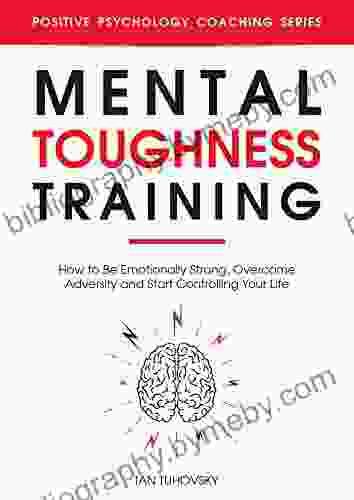How to Be Emotionally Strong: Overcome Adversity and Start Controlling Your Life

In today's world, it's more important than ever to be emotionally strong. We live in a fast-paced, demanding society that can take a toll on our mental health. We are constantly bombarded with negative news, social media, and other stressors that can make it difficult to stay positive and upbeat.
If you're struggling to cope with life's challenges, you're not alone. Many people struggle with emotional strength at some point in their lives. However, there are things you can do to improve your emotional strength and resilience.
In this article, we will discuss what emotional strength is, why it's important, and how you can develop it. We will also provide tips for overcoming adversity and starting to control your life.
4.4 out of 5
| Language | : | English |
| File size | : | 1182 KB |
| Text-to-Speech | : | Enabled |
| Screen Reader | : | Supported |
| Enhanced typesetting | : | Enabled |
| Word Wise | : | Enabled |
| Print length | : | 130 pages |
| Lending | : | Enabled |
Emotional strength is the ability to manage your emotions and thoughts in a healthy way. It's about being able to cope with stress, setbacks, and challenges without letting them overwhelm you.
Emotionally strong people are able to:
- Identify and challenge their negative thoughts
- Develop coping mechanisms
- Build resilience
- Stay positive and upbeat
- Control their emotions
Emotional strength is important for a number of reasons. It can help you:
- Cope with stress and adversity
- Achieve your goals
- Build and maintain healthy relationships
- Live a happier and more fulfilling life
If you're not emotionally strong, you're more likely to:
- Give up when things get tough
- Be overwhelmed by stress
- Make poor decisions
- Damage your relationships
- Experience mental health problems
There are a number of things you can do to develop your emotional strength. Here are a few tips:
- Identify and challenge your negative thoughts. Negative thoughts can sabotage your emotional strength. It's important to be able to identify your negative thoughts and challenge them. Ask yourself if there's any evidence to support your negative thoughts. Are you really as worthless as you think you are? Are things really as bad as they seem?
- Develop coping mechanisms. Coping mechanisms are healthy ways to deal with stress and adversity. Some examples of coping mechanisms include: exercise, meditation, yoga, spending time with loved ones, and talking to a therapist.
- Build resilience. Resilience is the ability to bounce back from setbacks and challenges. You can build resilience by setting realistic goals, learning from your mistakes, and developing a positive attitude.
- Stay positive and upbeat. It's important to stay positive and upbeat, even when things are tough. A positive attitude can help you to cope with stress and adversity. Try to focus on the good things in your life, and be grateful for what you have.
- Control your emotions. It's important to be able to control your emotions. If you're feeling overwhelmed, take some deep breaths and try to calm yourself down. Avoid acting on your emotions when you're angry or upset.
Everyone experiences adversity at some point in their lives. Adversity can come in many forms, such as:
- Losing a job
- Getting sick
- Experiencing a divorce
- Dealing with the death of a loved one
Adversity can be very challenging, but it's important to remember that you're not alone. Many people have overcome adversity and gone on to live happy and fulfilling lives.
If you're struggling to overcome adversity, here are a few tips:
- Seek support from others. Talk to your friends, family, or a therapist about what you're going through. Sharing your experiences with others can help you to feel supported and less alone.
- Focus on the positive. It's easy to get caught up in the negative when you're going through a difficult time. However, it's important to focus on the positive and remember that things will get better.
- Learn from your experience. Adversity can be a valuable learning experience. Take some time to reflect on what you've learned from your experience and how you can use it to grow and become stronger.
If you're feeling like you're not in control of your life, there are a few things you can do to take control back. Here are a few tips:
- Set goals for yourself. Setting goals can help you to give your life direction and purpose. Think about what you want to achieve in your life, both big and small.
- Take action. Once you have set goals for yourself, it's important to take action. Don't be afraid to step outside of your comfort zone and try new things.
- Be persistent. Don't give up on your goals easily. There will be times when things get tough, but it's important to keep going.
- Celebrate your successes. It's important to celebrate your successes, big and small. Taking the time to appreciate your accomplishments will help you to stay motivated and keep moving forward.
Developing emotional strength is an ongoing process. There will be times when you feel strong and resilient, and there will be times when you feel weak and vulnerable. The important thing is to never give up on yourself. Keep working on your emotional strength, and you will eventually achieve your goals.
Remember, you are not alone. Many people have overcome adversity and gone on to live happy and fulfilling lives. You can do it too.
4.4 out of 5
| Language | : | English |
| File size | : | 1182 KB |
| Text-to-Speech | : | Enabled |
| Screen Reader | : | Supported |
| Enhanced typesetting | : | Enabled |
| Word Wise | : | Enabled |
| Print length | : | 130 pages |
| Lending | : | Enabled |
Do you want to contribute by writing guest posts on this blog?
Please contact us and send us a resume of previous articles that you have written.
 Book
Book Novel
Novel Page
Page Chapter
Chapter Text
Text Story
Story Genre
Genre Reader
Reader Library
Library Paperback
Paperback E-book
E-book Magazine
Magazine Newspaper
Newspaper Paragraph
Paragraph Sentence
Sentence Bookmark
Bookmark Shelf
Shelf Glossary
Glossary Bibliography
Bibliography Foreword
Foreword Preface
Preface Synopsis
Synopsis Annotation
Annotation Footnote
Footnote Manuscript
Manuscript Scroll
Scroll Codex
Codex Tome
Tome Bestseller
Bestseller Classics
Classics Library card
Library card Narrative
Narrative Biography
Biography Autobiography
Autobiography Memoir
Memoir Reference
Reference Encyclopedia
Encyclopedia Marly Cornell
Marly Cornell Geert Mak
Geert Mak Gary E Schwartz
Gary E Schwartz Gabriela Mistral
Gabriela Mistral Isis Gaillard
Isis Gaillard Jenny Oldfield
Jenny Oldfield George C Thomas
George C Thomas Gil Scott Heron
Gil Scott Heron Don Baarns
Don Baarns Gil Reavill
Gil Reavill Laura Vanarendonk Baugh
Laura Vanarendonk Baugh Gary Gruber
Gary Gruber Funso Aiyejina
Funso Aiyejina Nick Timiraos
Nick Timiraos Ghada Karmi
Ghada Karmi Mark Arnold
Mark Arnold Gabe Baltazar
Gabe Baltazar Gary Zamchick
Gary Zamchick Frye Gaillard
Frye Gaillard George Saunders
George Saunders
Light bulbAdvertise smarter! Our strategic ad space ensures maximum exposure. Reserve your spot today!

 Emmett MitchellThe Untold Story Behind the Founder of Men's Wearhouse: A Journey of Courage,...
Emmett MitchellThe Untold Story Behind the Founder of Men's Wearhouse: A Journey of Courage,... Ervin BellFollow ·3.7k
Ervin BellFollow ·3.7k Damon HayesFollow ·2.2k
Damon HayesFollow ·2.2k Tom HayesFollow ·13.7k
Tom HayesFollow ·13.7k Hugo CoxFollow ·18.3k
Hugo CoxFollow ·18.3k Keith CoxFollow ·4.9k
Keith CoxFollow ·4.9k John MiltonFollow ·8.7k
John MiltonFollow ·8.7k Jean BlairFollow ·3.9k
Jean BlairFollow ·3.9k Langston HughesFollow ·14.9k
Langston HughesFollow ·14.9k

 Brian West
Brian WestSmedley Butler: The Marines and the Making and Breaking...
: A Marine's...

 Gabriel Garcia Marquez
Gabriel Garcia MarquezIschia, Capri, Sorrento, Positano, And Amalfi: An...
Explore the...

 Felix Carter
Felix CarterAdorn Your Little Princess with Fleur Ange's Exquisite...
Welcome to the enchanting...

 Kelly Blair
Kelly BlairUnveiling the Secrets of the Historical Way and Fishermen...
Step into the pages...

 Angelo Ward
Angelo WardKnit the Cutest Thumbless Mittens for Your Little One:...
Prepare to be...
4.4 out of 5
| Language | : | English |
| File size | : | 1182 KB |
| Text-to-Speech | : | Enabled |
| Screen Reader | : | Supported |
| Enhanced typesetting | : | Enabled |
| Word Wise | : | Enabled |
| Print length | : | 130 pages |
| Lending | : | Enabled |












